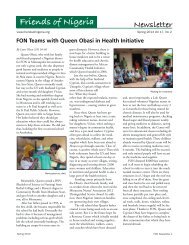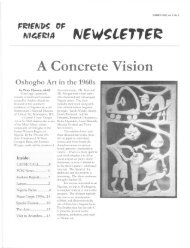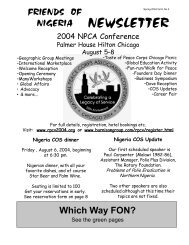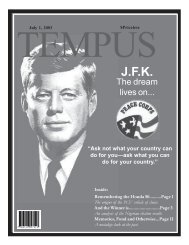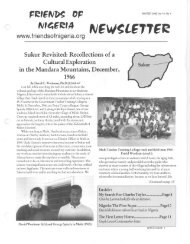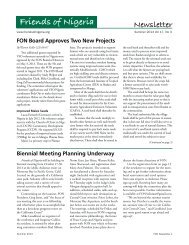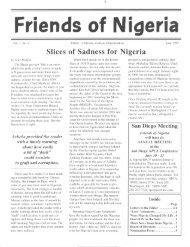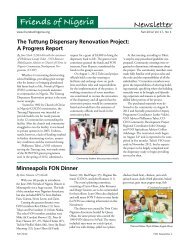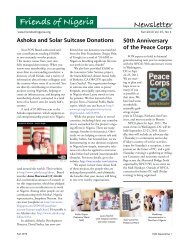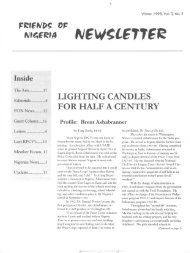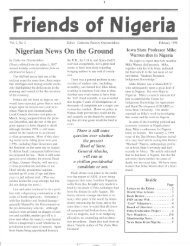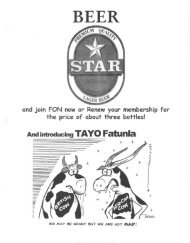NEWSLETTER - Friends of Nigeria
NEWSLETTER - Friends of Nigeria
NEWSLETTER - Friends of Nigeria
You also want an ePaper? Increase the reach of your titles
YUMPU automatically turns print PDFs into web optimized ePapers that Google loves.
Wole Soyinka’s Memoir<br />
Book Review<br />
You Must Set Forth at Dawn:<br />
A Memoir<br />
by Wole Soyinka<br />
499 pp. Random House: NY 2006 $26.95<br />
Reviewed by Ed Gruberg (5) 62-64<br />
In its 46 years since independence <strong>Nigeria</strong> has the dubious<br />
distinction <strong>of</strong> never having had one civilian federal government<br />
succeed another one. Perhaps 2007 will be different. President<br />
Obasanjo has been constitutionally and legislatively blocked from<br />
seeking a third term next year and the forces <strong>of</strong> democracy are<br />
perhaps strong enough to keep the military in check.<br />
It is a perfect time to read Wole Soyinka’s new political<br />
memoir, You Must Set Forth at Dawn. The book begins in the late<br />
1950s, when Soyinka was a student in the UK, and ends<br />
somewhat triumphally at the beginning <strong>of</strong> the current<br />
civilian government. And what a story he tells. He has<br />
known most <strong>of</strong> those who have ruled <strong>Nigeria</strong>. He has<br />
been an eloquent, fearless, independent member <strong>of</strong> the<br />
democratic opposition. He has written plays and poems<br />
and novels and memoirs, run his own theater companies,<br />
spent time in <strong>Nigeria</strong>n jails, and won the Nobel Prize in<br />
literature.<br />
He was something special from the beginning. As a<br />
student in the UK he was reading his poems on the BBC<br />
and building a theatrical reputation. He was not impressed<br />
with the first batch <strong>of</strong> politicians <strong>of</strong> soon-to-be<br />
independent <strong>Nigeria</strong>, with their “preening, ostentatious<br />
spending, [and] cultivated condescension...toward the<br />
people they were supposed to represent.” He was<br />
obsessed with “the humiliation <strong>of</strong> racist entrenchment in<br />
Southern Africa” and coped with it by an “inner confidence <strong>of</strong><br />
one’s mental superiority.” He had a passing interest in fighting<br />
for freedom in Hungary as preparation for fighting in South<br />
Africa. But his father wrote “You were sent over there to study.<br />
In any case, charity begins at home, so if you feel inclined to<br />
jeopardize your studies by succumbing to some war-like urge,<br />
kindly return home and make this your battlefield.” Soyinka<br />
thought his father was “infuriatingly rational.” He came home 9<br />
months before <strong>Nigeria</strong> became independent. He had a Rockefeller<br />
Fellowship and traveled throughout <strong>Nigeria</strong> documenting<br />
performing companies and sizing up the country. He was<br />
exhilarated on the road “but it is not all idyllic. The road was a<br />
violent host.... in the road’s later decay is recorded a nation’s<br />
retreat from a humanism I had imbibed quite unconsciously<br />
from childhood...the nation turned carrion and scavenger.”<br />
Most <strong>of</strong> the book is about the rough and tumble <strong>of</strong> <strong>Nigeria</strong>n<br />
political life with which he was involved “in a very personal<br />
obsessive way.” He tells <strong>of</strong> the night in 1965 he prevented the<br />
broadcast <strong>of</strong> a taped victory speech by Western Premier S.L.<br />
Akintola after a rigged election. Soyinka borrowed a tape recorder<br />
from a Peace Corps volunteer and taped a counter message. Masked,<br />
he sneaked into the radio station gun in hand. “It all proceeded<br />
according to plan. The duty <strong>of</strong>ficer responded as any sensible person<br />
would under the gun ...removed the premier’s tape and replaced it<br />
with mine: ‘Drop your stolen mandate, leave town, and take your<br />
reprobates with you.’” With the help <strong>of</strong> a network <strong>of</strong> friends<br />
Soyinka escaped to the East. Eventually he came back and was<br />
charged with “robbery with violence.” Conviction could carry a life<br />
sentence. He expected a political trial, not this. “True, I had made<br />
away with the tape <strong>of</strong> the Western Region and there was the<br />
unavoidable introduction <strong>of</strong> a firearm in the process, but I did leave<br />
my own tape in its place. And if it was a question <strong>of</strong> content, well,<br />
the comparative value <strong>of</strong> both messages was something that could<br />
have been settled amicably in a court <strong>of</strong> arbitration. I would be the<br />
first to admit that, in wit, word play, and verbal resonance, my<br />
Wole Soyinka in 1963<br />
humorless message - and in strident accents <strong>of</strong> the English<br />
language to boot - was no match for Ladoke Akintola’s adroit<br />
Yoruba.” The judge dismissed the charges because <strong>of</strong> contradictions<br />
in the prosecutor’s case. Soyinka had spent 3 months in jail awaiting<br />
the trial.<br />
From farce to tragedy, the nation falls apart with coup and<br />
counter-coup and ethnic killings in 1966. In 1967 Biafra breaks away<br />
and civil war is imminent. Soyinka feels the need to travel to Biafra<br />
to try somehow to prevent the conflict and to co-opt the two sides<br />
with a more peaceful “third force.” He meets with O. Ojukwu, the<br />
head <strong>of</strong> Biafra, who is unyielding. But he also meets Victor Banjo, a<br />
Yoruba military <strong>of</strong>ficer in the Biafran army who wants to take a<br />
(Continued on page 11)<br />
10 FON <strong>NEWSLETTER</strong> www.friends<strong>of</strong>nigeria.org



